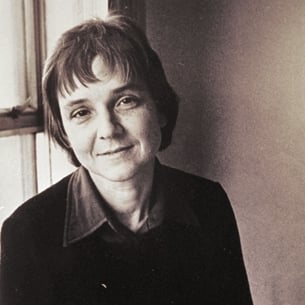The Dream of a Common Language: Poems 1974-1977 by Adrienne Rich
By Sarah Wyman | On January 11, 2018 | Updated October 25, 2021 | Comments (0)

The Dream of a Common Language: Poems 1974 – 1977 (1978) appeared early on in Adrienne Rich’s (1929 – 2012) long career and solidified her position as a leader who articulated the central ideas of the second wave U.S. feminist movement.
These poems, about and for women, envision an alternative to a patriarchal system in which men control the avenues of power and the definitions of female existence. In this analysis, we’ll discuss how this collection of poems continued to establish the primary concerns of Rich’s life’s work. These included the promotion of:
- solidarity among women and the power that emerges from their collaboration;
- the legitimacy of lesbian existence within a homophobic world;
- a re-conceptualization of motherhood as institution
- the mind’s relation to the body
- and the destructive nature of a dominant culture that renders its marginalized members invisible and silent.
Rich refuses any division between the artistic and political aspects of her poetry as she uses both to explore social relations in a world hostile to female identity and creativity.
. . . . . . . . . .
. . . . . . . . . .
In Diving Deep and Surfacing: Women Writers on Spiritual Quest (1980), Carol P.Christ observes that the title of this book, The Dream of a Common Language, “suggests that Rich is turning from describing the wreck of male culture to the new naming of self and world that arises out of the experience of nothingness. The title calls attention to the key role of language in articulating and shaping women’s experiences of new being.”
The first poem, “Power,” describes Marie Curie’s discovery of radiation and her ensuing death, as the poet links the notion of woman’s power with the danger of not knowing how to handle it.
Power
Living in the earth-deposits of our history
Today a backhoe divulged out of a crumbling flank of earth
one bottle amber perfect a hundred-year-old
cure for fever or melancholy a tonic
for living on this earth in the winters of this climate
Today I was reading about Marie Curie:
she must have known she suffered from radiation sickness
her body bombarded for years by the element
she had purified
It seems she denied to the end
the source of the cataracts on her eyes
the cracked and suppurating skin of her finger-ends
till she could no longer hold a test-tube or a pencil
She died a famous woman denying
her wounds
denying
her wounds came from the same source as her power
Phantasia for Elvira Shatayev
The second poem, “Phantasia for Elvira Shatayev,” celebrates the courage and commitment of a group of woman who perished together on a climbing expedition. In the poem “Origins and History of Consciousness,” Rich equates “The drive / to connect” with “the dream of a common language.”
Rich’s notion of a common language stresses a desire for the direct communication of care and concern within a community of speakers and the power that ensues from this achievement.
At this point in Rich’s evolving process — separatist, radical feminist — she reserves dialogue for the shared experience of women. Although they may remain only dreams, such creative acts can bring forth new realities in the face of a damaging, male-dominated culture where women are not full participants.
. . . . . . . . . .
Dream of a Common Language on Bookshop.org* and on Amazon*
. . . . . . . . . .
Twenty-One Love Poems
The central cycle of twenty-one sonnet-like lyrics, “Twenty-One Love Poems,” originally appeared as a separate volume. These poems incorporate the personal and the public as they invoke the experience of physical and emotional love between As several critics have commented, the intensely erotic “(The Floating Poem, Unnumbered)” resists the dominant male discourse by breaking the formal pattern and omitting a roman numeral.
Although these works correspond with a period in her life when Rich’s marriage to Harvard Economics professor Alfred Conrad had ended and she was involved in lesbian relationships, (including one with Michelle Cliff that would last until her death), the poems are socially engaged rather than overtly autobiographical or confessional.
. . . . . . . . . .
Learn more about Adrienne Rich
. . . . . . . . . .
Critics’ responses to The Dream of a Common Language
The critics’ varied response to The Dream of a Common Language sparked debates that increased Rich’s popularity and notoriety in the public sphere. By 1975, Barbara Gelpi and Albert Gelpi had already declared Rich a “pioneer, witness and prophet” of the U.S. women’s movement (Gelpi and Gelpi 1993, xi).
Many celebrated her attention to women’s history, her rhetorical talent, and her outspoken approach to taboo topics. Others warned against her generalized category of womanhood and condemned what they saw as the continuation of an obsessively anti-male focus on patriarchal power.
Sensing this backlash, Rich shifted her lens from the world of men to that of women in both Of Woman Born: Motherhood as Experience and Institution (1976) and Dream of a Common Language. Nevertheless, several critics rejected her incorporation of poetry and politics: some declared her work overtly propagandistic, didactic, and dogmatic.
The legacy of Adrienne Rich
At the time of her death, Rich enjoyed an international following. Dream of a Common Language marks a pivotal moment early in her literary career when she leaves traditional forms behind and exhibits the use of her creative intelligence to re-vision the world with “fresh eyes”.” (Rich 1979, 35).
Rich, who was white, won the 1974 National Book Award for Diving into the Wreck. In a characteristic move, she refused the award as an individual but accepted it with fellow nominees Alice Walker, who is black, and Audre Lorde, who was also black, “in the name of all women whose voices have gone and still go unheard in a patriarchal world.”
Rich leaves her mark on today’s popular culture as an innovative, anti-racist feminist who maintained her commitment to dialogue as an instrument for change in the world.
Contributed by Sarah Wyman, Associate Professor of English, SUNY-New Paltz.
Further Reading and sources
Cooper, Jane Roberta, ed. 1984. Reading Adrienne Rich: Reviews and Re-Visions, 1951-81. Ann Arbor, MI: University of Michigan Press.
Gelpi, Barbara Charlesworth and Albert Gelpi, eds. 1993. Adrienne Rich’s Poetry and Prose: Poems, Prose, Reviews and Criticism. New York: W.W. Norton.
Keyes, Claire. 1986. The Aesthetics of Power: The Poetry of Adrienne Rich. Athens, GA: University of Georgia Press.
Langdell, Cheri Colby. 2004. Adrienne Rich: The Moment of Change. Westport, CT: Praeger.
Martin, Wendy. 1984. An American Triptych: Anne Bradstreet, Emily Dickinson, Adrienne Rich. Chapel Hill, NC: University of North Carolina Press.
Nelson, Cary. 1981. “Meditative Aggressions: Adrienne Rich’s Recent Transactions with History.” In Our Last First Poets: Vision and History in Contemporary American Poetry. Urbana, IL: University of Illinois Press.
Rich, Adrienne. 1979. “When We Dead Awaken: Writing as Re-Vision 1971.” On Lies, Secrets, and Silence: Selected Prose 1966-1978. New York: Norton.
Vendler, Helen. 1980. Part of Nature, Part of Us: Modern American Poets. Cambridge, MA: Harvard.
Werner, Craig. 1988. Adrienne Rich: The Poet and Her Critics. Chicago: American Library Association.
A shorter version of this essay appears in Women’s Rights: Reflections in Popular Culture. Ed. Ann Savage. Greenwood, 2017, 116 – 117.
. . . . . . . . . .
*These are Bookshop Affiliate and Amazon Affiliate links. If a product is purchased by linking through, Literary Ladies Guide receives a modest commission, which helps maintain our site and helps it to continue growing!



Leave a Reply